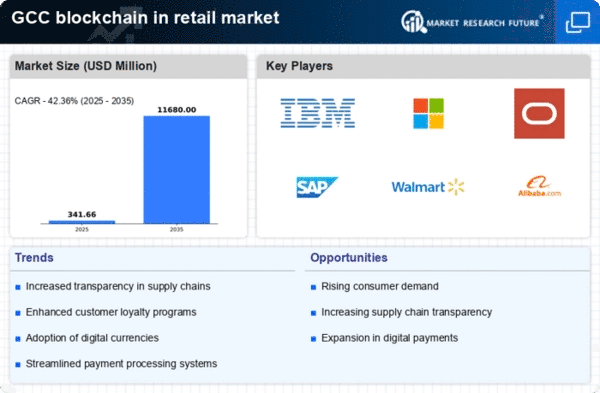Enhanced Security and Fraud Prevention
The blockchain in-retail market is benefiting from heightened security measures that blockchain technology offers. With the rise of digital transactions, retailers face increasing threats of fraud and data breaches. Blockchain's immutable ledger provides a robust framework for securing transactions, which is particularly crucial in the GCC, where e-commerce is rapidly expanding. Retailers adopting blockchain can potentially reduce fraud-related losses by up to 50%. This enhanced security not only protects retailers but also instills consumer confidence, encouraging more online purchases. As security concerns continue to grow, the integration of blockchain is likely to become a standard practice in the retail sector.
Integration with Emerging Technologies
The blockchain in-retail market is increasingly intersecting with other emerging technologies such as artificial intelligence (AI) and the Internet of Things (IoT). This convergence is expected to create innovative solutions that enhance customer experiences and operational efficiencies. For instance, integrating blockchain with IoT devices can facilitate real-time tracking of inventory and automated reordering processes. In the GCC, where technological adoption is high, retailers are exploring these synergies to differentiate themselves in a competitive landscape. The potential for improved data analytics and customer insights through this integration may drive further investment in blockchain solutions.
Regulatory Compliance and Standardization
The blockchain in-retail market is influenced by the evolving landscape of regulatory compliance and standardization. As governments in the GCC region establish frameworks for blockchain technology, retailers are compelled to align their operations with these regulations. Compliance not only ensures legal adherence but also enhances consumer trust. Retailers that proactively adopt blockchain solutions may find themselves at a competitive advantage, as they can demonstrate compliance more efficiently. The potential for reduced regulatory risks and improved operational transparency is likely to drive further adoption of blockchain technology in the retail sector.
Increased Consumer Demand for Transparency
The blockchain in retail market is experiencing a notable surge in consumer demand for transparency regarding product origins and supply chain processes. As consumers become more conscious of ethical sourcing and sustainability, retailers are compelled to adopt blockchain technology to provide verifiable information about their products. This shift is evidenced by a 30% increase in consumer preference for brands that utilize blockchain for traceability. Retailers in the GCC are recognizing that transparency not only enhances brand loyalty but also mitigates risks associated with counterfeit goods. Consequently, the integration of blockchain solutions is becoming a strategic imperative for retailers aiming to meet evolving consumer expectations and maintain competitive advantage.
Cost Reduction through Operational Efficiency
The blockchain in-retail market is poised for growth as retailers seek to reduce operational costs through enhanced efficiency. By leveraging blockchain technology, retailers can streamline processes such as inventory management and payment systems, potentially reducing transaction costs by up to 20%. The decentralized nature of blockchain allows for real-time data sharing among stakeholders, minimizing delays and errors. In the GCC, where operational costs can be substantial, the adoption of blockchain solutions is seen as a viable strategy to improve profit margins. Retailers are increasingly investing in blockchain to automate processes, thereby reallocating resources to more value-added activities.

















